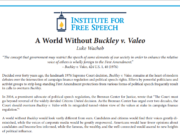When governments pass laws intended to curb the influence of wealth in politics, they often end up with regulatory regimes that are either so strict or so complex that legal counsel is necessary to navigate them. The unintended consequence of these laws is that they actually elevate the influence of the wealthy, who can afford to hire whatever lawyers and accountants are needed to comply with regulations, while stamping out a great deal of grassroots speech from ordinary citizens who cannot afford those resources.
As much as we point out this reality of unintended consequences, it’s always nice to hear actual regulators acknowledging the phenomenon. Enter Megan Tooker, Executive Director of the Iowa Ethics & Campaign Disclosure Board. In a Waterloo-Cedar Falls Courier article on nonprofit spending in Iowa’s state elections, Ms. Tooker explains why the state hasn’t seen enormous outside spending increases in the wake of the Supreme Court’s 2010 decision in Citizens United:
“In Iowa we’re seeing less of that activity because we have unlimited campaign contributions,” she said. “My perception of how this is working is we have a lot of big donors that are comfortable giving to candidates or the party, and they know how to do that, they do it well and why change it? I think in states that have hard limits, people give the maximum amount of money, and then they look for other ways to get involved.”
We couldn’t have said it better ourselves. The unintended consequence of instituting low contribution limits is that it incentivizes donors and organizations to innovate new ways of organizing to speak and influence policy outside of direct contributions to candidates and political parties. If the law then goes after those new forms of activity, further innovation will take place. This constant evolution wouldn’t occur if people were simply allowed to give as much as they want directly to candidates. This regulatory maze also increases the risk that political outcomes will be influenced more by who employs the cleverest lawyer rather than who has the best ideas for public policy.
By allowing unlimited contributions (at least from individuals, political parties, PACs, and unions giving to candidates), Iowa avoids this messy process entirely and ensures that their citizens do not have to get creative looking for ways of getting involved in state politics. And Iowa is not alone in its approach: a total of 12 states currently allow citizens to make unlimited contributions to candidates. Other states appear to be catching on to the wisdom of this approach, as nine states raised or eliminated contribution limits in 2013, many in response to rising independent spending in the wake of Citizens United.
If sunlight is truly the best disinfectant for corruption in government, more states should join the trend of raising or eliminating contribution limits. As Iowa’s experience shows, spending by independent groups will be a lot less prominent when you allow citizens a straightforward means of associating with and supporting candidates. It’s good news for both defenders of the First Amendment and government watchdogs that more and more states seem to be realizing that.













